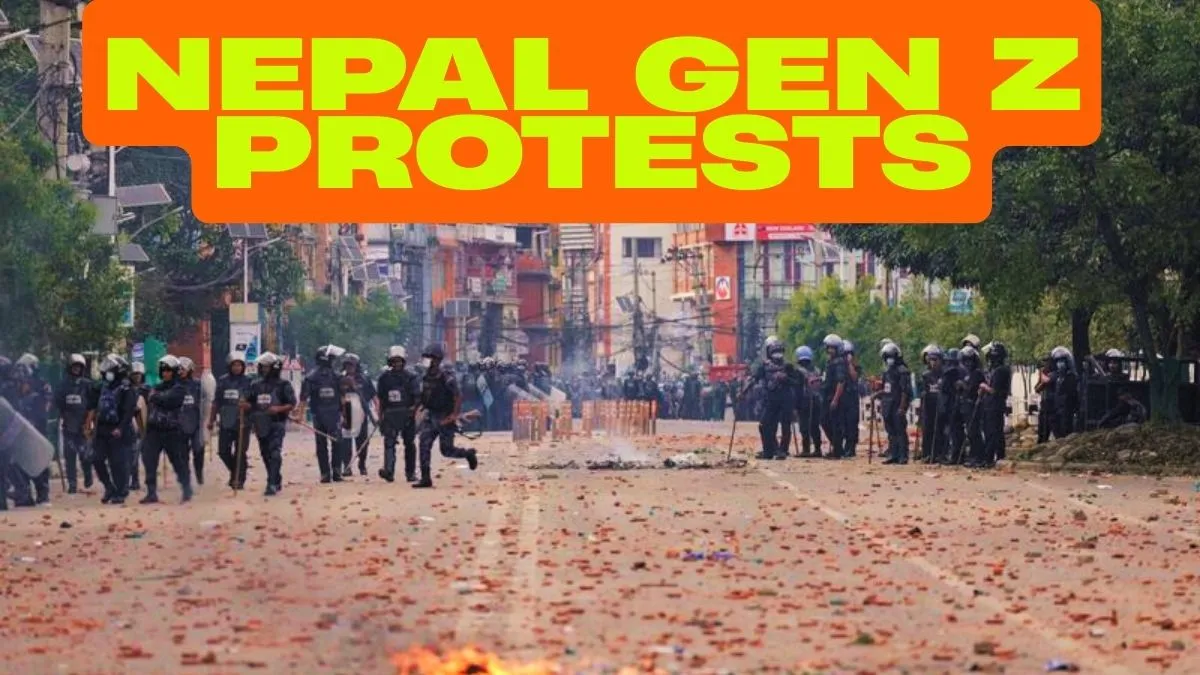- By Ajeet Kumar
- Tue, 09 Sep 2025 08:32 AM (IST)
- Source:JND
Nepal Gen Z Protests: Violent protests by youths against a government ban on social media sites rocked Nepal on Monday, with police's use of force leaving at least 19 people dead and over 300 others injured, and Home Minister Ramesh Lekhak resigning over the situation. Although the protests were mainly linked to the social media ban but local media reported it was a reality check between a politician's life and the common people.
#WATCH | Nepal | People in Kathmandu stage a massive protest against the government over alleged corruption and the recent ban on social media platforms, including Facebook, Instagram, WhatsApp and others.
— ANI (@ANI) September 8, 2025
At least 18 people have died and more than 250 people have been injured… pic.twitter.com/9pO8yj2e1h
Nepal social media ban
Nepal on Thursday banned social media sites such as Facebook, Instagram, and YouTube, among others, for failing to register with the Ministry of Communication and Information Technology within the given deadline.
The government said social media users with fake IDs have been spreading hate speech and fake news, and committing fraud and other crimes via some platforms. According to the notice issued by the Nepal ministry, the social media companies were given seven days from August 28 to register. Even when the deadline expired on Wednesday night, none of the large social media platforms — including Meta (Facebook, Instagram, WhatsApp), Alphabet (YouTube), X (formerly Twitter), Reddit, and LinkedIn —submitted applications.
#WATCH | Kathmandu, Nepal: A protestor says, "We are here to protest against the corruption and the ban of social media. There are people dying on the streets. I have seen more than 15 people being shot. There is not enough ambulances, and the hospitals are running out of… https://t.co/jLA7fEJlq8 pic.twitter.com/OiTxzVeeUr
— ANI (@ANI) September 8, 2025
Was the social media ban the only reason for the Nepal protests?
But is the protest only about the social media ban, or is it something more? According to local media reports, a group of youngsters launched a campaign called “Nepo Kid” on various social media platforms. “Nepo Kid”, a social media trend, has become viral in recent days, with youngsters accusing the children of politicians and influential people of “enjoying privileges with money earned from corruption”.
The trend on social media put politicians in an uncomfortable situation. The trend has exposed a stark difference in politicians' kids' lives and how a common family suffers due to inflation and unemployement.
Nepal lifts social media ban after 19 Gen Z protestors killed
Although Nepal Minister for Communication, Information and Broadcasting Prithvi Subba Gurung announced that the government has withdrawn its earlier decision to ban social media sites following an emergency meeting of the Cabinet.
Govt did not intend to ban social media but...: PM Oli
Prime Minister Oli on Sunday said that his government would “always oppose anomalies and arrogance, and would never accept any act that undermines the nation”. However later on Monday, Oli, expressing his grief over the deaths, alleged that there was "infiltration by some unwanted elements in the peaceful demonstration" that compelled the government to use force to protect public property from being damaged. “The government did not intend to ban social media sites, but to regulate them,” he said. He also announced a probe committee would be formed that would submit its report within 15 days.
ALSO READ: What's Driving Gen Z's Violent Protests Against Nepal's Govt? 5 Key Points Explained
Gen Z protestors entered Nepali Parliament
‘Gen Z', spearheaded a massive protest in front of the Parliament in the heart of Kathmandu.
Earlier, thousands of youths, including school students, under the banner of Gen Z, staged a massive protest in front of the Parliament in the heart of Kathmandu and shouted anti-government slogans demanding immediate revocation of the ban.
The demonstration turned violent when some protesters entered the Parliament complex, prompting police to use water cannons, tear gas, and live rounds to disperse crowds, eyewitnesses said. Nepal Police spokesperson Binod Ghimire said 19 people were killed in clashes in various parts of Kathmandu during the rally, and two protesters died in Sunsari district of eastern Nepal in police firing.
The minister also requested the protesting Gen Z group to withdraw their protest programme.
Curfew imposed, army deployed
Following the violence, the local administration imposed a curfew in several parts of the capital. Besides Kathmandu, curfew orders were issued in Lalitpur district, Pokhara, Butwal and Itahari of Sunsarai district. The Nepali Army was deployed in the capital after the situation deteriorated. The army personnel took control of the roads surrounding the parliament complex in New Baneshwor.
#WATCH | Nepal: Visuals from Kathmandu this morning, after the massive protest yesterday against the government over alleged corruption and the recent ban on social media platforms. A curfew has been imposed here until further notice.
— ANI (@ANI) September 9, 2025
As per the Nepal Govt, at least 18 people… pic.twitter.com/uDJGQelPxz
“No movement of people, demonstration, meeting, gathering, or sit-in will be allowed in the restricted zone,” Chief District Officer Chhabi Lal Rijal said in a notice. The local administration later extended the restrictive order to various areas surrounding Rastrapati Bhawan, the Vice-President's residence and the Prime Minister's Office.
(With inputs from agencies)

